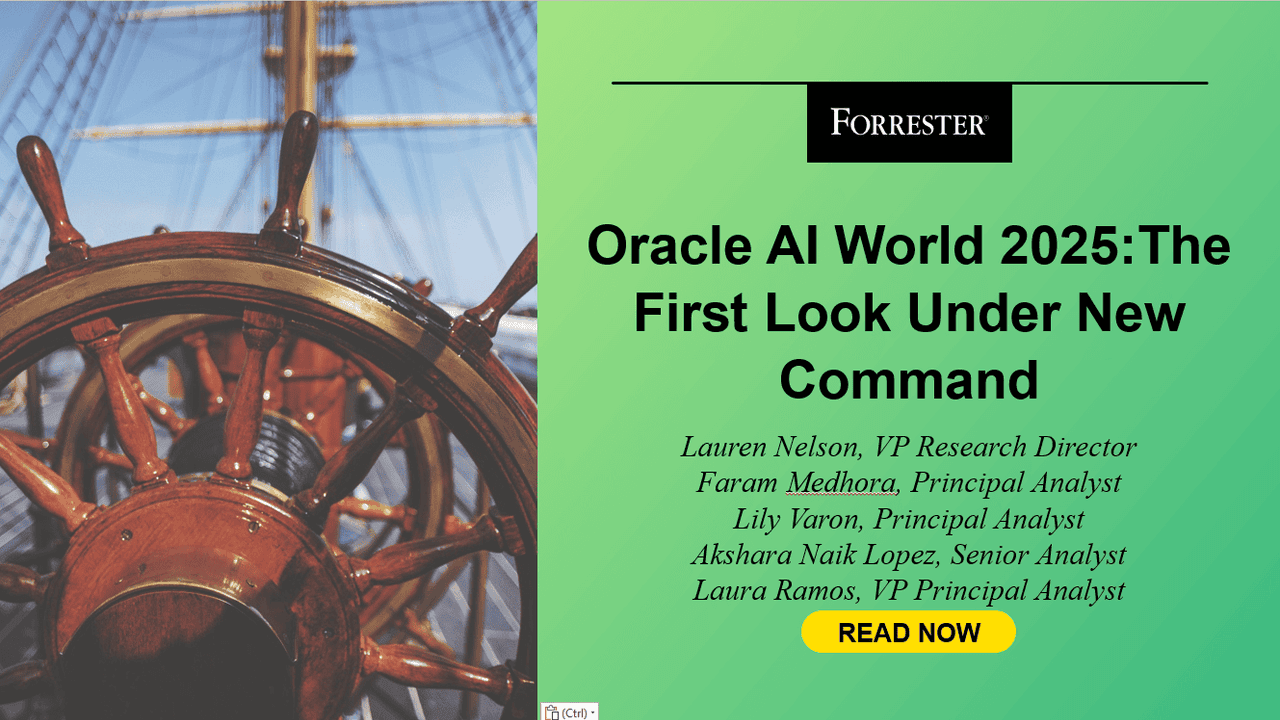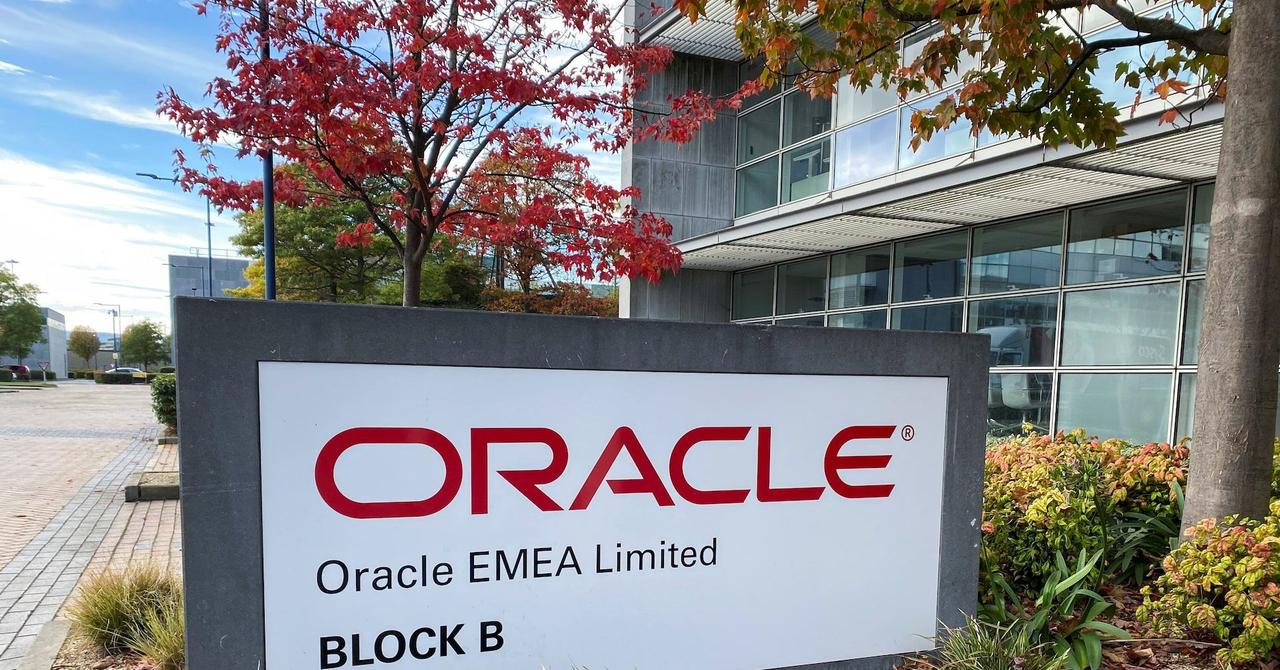Meta Partners with Oracle Cloud to Enhance Llama AI Model Training
2 Sources
2 Sources
[1]
Meta signs major AI deal to train Llama on Oracle Cloud
Oracle Cloud will look to enhance the training and deployment of Llama LLM family Oracle has signed a deal with Meta that will see the latter use Oracle Cloud to enhance the training and deployment of its Llama LLM family. "We just signed an agreement with Meta - for them to use Oracle's AI Cloud Infrastructure - and collaborate with Oracle on the development of AI Agents based on Meta's Llama models," CTO Larry Ellison confirmed. "Oracle Cloud Infrastructure trains several of the world's most important generative AI models because we are faster and less expensive than other clouds...Oracle trained AI models and AI Agents will improve the rate of scientific discovery, economic development and corporate growth throughout the world. The scale of the opportunity is unimaginable." Meta's decision to use Oracle Cloud comes as Oracle CEO Safra Catz praised the company's record-breaking cloud infrastructure growth, driven by continued demand for AI, which requires large amounts of computing power. Despite announcing a healthy 9% year-over-year increase in quarterly revenue, shares in Oracle are down, marking a lack of investor confidence. On the whole, Oracle's second-quarter results were a mixed bag. Quarterly revenue rose 9% year-over-year to $14.06 billion, however analysts had previously anticipated this figure would stand at $14.1 billion. Adjusted earnings per share also fell short of the anticipated $1.48 by one cent. Making up more than three-quarters (77%) of the company's entire revenue was its cloud business, which saw revenue rise by 12% to $10.81 billion. Catz boasted: "Record level AI demand drove Oracle Cloud Infrastructure revenue up 52% in Q2, a much higher growth rate than any of our hyperscale cloud infrastructure competitors." She added that GPU consumption was up 336% in the three-month period. However, the outlook remains precarious, with the company forecasting revenue growth of 7% to 9% in the current quarter, falling short once again of analysts' expectations. TechRadar Pro has asked Oracle and Meta for more details on the deal, but neither company immediately responded to our email.
[2]
Oracle Powers Meta's Llama Models
On Monday, Oracle announced its fiscal 2025 Q2 results, reporting a 9% year-over-year increase in total revenue, reaching $14.1 billion. Cloud revenue totalled $5.9 billion, up 24% in both USD and constant currency. Interestingly, Larry Elison, CTO at Oracle, revealed during the earnings call that Oracle had signed an agreement with Meta to use the company's AI Cloud infrastructure and collaborate on the development of AI Agents based on Meta's Llama models. "Record-level AI demand drove Oracle Cloud Infrastructure revenue up 52% in Q2, a much higher growth rate than any of our hyperscale cloud infrastructure competitors," said Oracle CEO Safra Catz. She added that Oracle expects Cloud revenue to top $25 billion this fiscal year. "We delivered the world's largest and fastest AI SuperComputer scaling up to 65,000 NVIDIA H200 GPUs," said Catz commenting on how GPU consumption rose by 336% during the quarter, reflecting rapid growth in AI-related workloads. However, when compared to industry leaders, Oracle's cloud revenue scale still lags. In the previous quarter, Amazon Web Services (AWS) earned $27.5 billion in revenue, a 19% increase from the same quarter a year ago. Microsoft's Intelligent Cloud revenue reached $24.1 billion, up 20%. Meanwhile, Google Cloud's revenue surged 35%, reaching $11.4 billion. The company shares fell 9% on Tuesday, signalling investor concerns over fierce competition in the cloud business amid higher demand from AI service providers, Reuters reported. "Oracle Cloud Infrastructure trains several of the world's most important generative AI models because we are faster and less expensive than other clouds," said Ellison. Ellison further emphasised the scope of Oracle's AI capabilities, saying, "Oracle trains dozens of specialised AI models and embeds hundreds of AI Agents in cloud applications," including automating drug design, detecting fraud, and analyzing satellite images to improve agricultural output. Oracle has officially entered the multi-cloud era. Following its partnership with Microsoft Azure and Google Cloud, earlier this year, the company also teamed up with AWS to launch Oracle Database@AWS. This service will allow customers to use Oracle Autonomous Database and Exadata Database Service within AWS' data centres. "We're at the very beginning of multi-cloud. It's going to exceed well over $100 million in its first year," said Ellison. He further explained that the first year began when Oracle got AWS and had all three, including Microsoft Azure and Google Cloud. "It will be a multibillion-dollar business, and it'll be a combination of AWS, Google, and Azure, plus all of these Cloud@Customer, Dedicated Region Cloud@Customer. We're going to have hundreds of those regions," he added. Ellison said that the demand from individual customers, large banks, and telecoms is so great that they are building nearly half a dozen data centres.
Share
Share
Copy Link
Meta signs a major deal with Oracle to use its cloud infrastructure for training and deploying the Llama language model family, marking a significant collaboration in the AI industry.

Meta and Oracle Forge Strategic AI Partnership
In a significant move that underscores the growing importance of cloud infrastructure in AI development, Meta has signed a major deal with Oracle to leverage its cloud services for enhancing the training and deployment of Meta's Llama language model family
1
. This collaboration marks a pivotal moment in the AI industry, bringing together a leading social media giant and a renowned cloud services provider.Oracle's AI Cloud Infrastructure Takes Center Stage
Oracle's Chief Technology Officer, Larry Ellison, announced the partnership during the company's fiscal 2025 Q2 earnings call. Ellison emphasized the superiority of Oracle's AI Cloud Infrastructure, stating, "Oracle Cloud Infrastructure trains several of the world's most important generative AI models because we are faster and less expensive than other clouds"
2
. This claim is supported by Oracle's impressive 52% revenue growth in its Cloud Infrastructure segment, outpacing its competitors in the hyperscale cloud market.Record-Breaking AI Demand Drives Oracle's Growth
Oracle's CEO, Safra Catz, reported a staggering 336% increase in GPU consumption during the quarter, reflecting the rapid growth in AI-related workloads
2
. This surge in demand has propelled Oracle's cloud business to new heights, with cloud revenue now accounting for 77% of the company's total revenue1
. Oracle expects its cloud revenue to exceed $25 billion this fiscal year, showcasing the lucrative nature of AI-driven cloud services.Implications for Meta's Llama Models
The partnership is expected to significantly boost the capabilities of Meta's Llama language models. By leveraging Oracle's advanced cloud infrastructure, Meta aims to enhance both the training and deployment processes of its AI models
1
. This collaboration could potentially accelerate the development of more sophisticated and efficient AI agents based on the Llama architecture.Related Stories
Oracle's Multi-Cloud Strategy and AI Innovations
Oracle's partnership with Meta is part of a broader multi-cloud strategy that includes collaborations with other tech giants such as Microsoft Azure, Google Cloud, and Amazon Web Services
2
. Larry Ellison projects that this multi-cloud approach will evolve into a multibillion-dollar business, with Oracle planning to build numerous data centers to meet the growing demand from large enterprises.Market Response and Future Outlook
Despite the positive news surrounding the Meta partnership and strong cloud growth, Oracle's stock experienced a 9% drop following the earnings announcement
2
. This decline reflects investor concerns about fierce competition in the cloud business and Oracle's ability to maintain its growth trajectory in the face of established players like AWS, Microsoft, and Google Cloud.As the AI industry continues to evolve rapidly, partnerships like the one between Meta and Oracle are likely to play a crucial role in shaping the future of AI development and deployment. The collaboration not only highlights the critical importance of robust cloud infrastructure in AI advancement but also signals a new era of strategic alliances in the tech world.
References
Summarized by
Navi
Related Stories
Oracle and Meta in Talks for Massive $20 Billion AI Cloud Computing Deal
19 Sept 2025•Business and Economy

Oracle's Q3 Earnings: AI Drives Growth Despite Missing Wall Street Expectations
11 Mar 2025•Business and Economy

Oracle AI World 2025: A New Era of AI Integration and Multicloud Strategy
16 Oct 2025•Technology

Recent Highlights
1
Pentagon threatens to cut Anthropic's $200M contract over AI safety restrictions in military ops
Policy and Regulation

2
ByteDance's Seedance 2.0 AI video generator triggers copyright infringement battle with Hollywood
Policy and Regulation

3
OpenAI closes in on $100 billion funding round with $850 billion valuation as spending plans shift
Business and Economy





